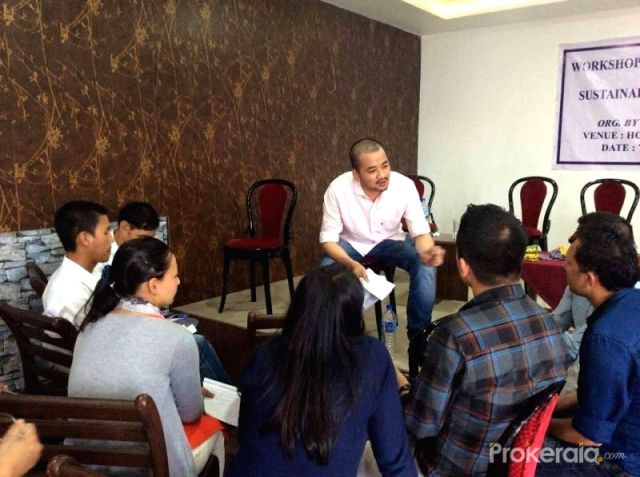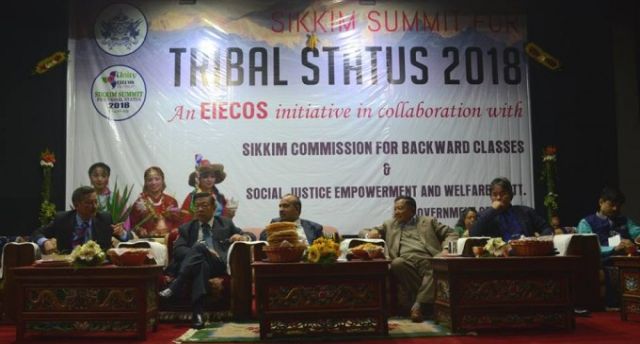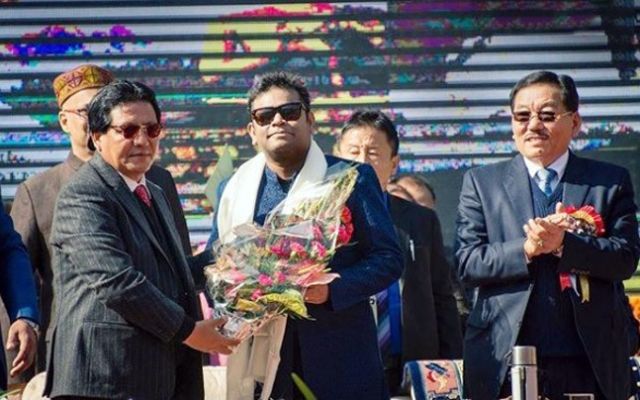
by admin | May 25, 2021 | Business, Business Ideas, Emerging Businesses, Employment, Entrepreneurship, Home-Based Business, Investing, Medium Enterprise, Private Jobs, SMEs, Startup Basics, Your Business Plan

Founder of NE Taxi Rewaj Chhetri
By Sarwar Kashani,
Gangtok : Sikkim has many distinctions that give the tiny state nestled in the Himalayas between India and China a larger-than-life profile. It is the only organic state in India, is litter- and defecation-free, has high literacy and has the best working conditions for women. But the challenge of unemployment it faces is huge which has made many embrace entrepreneurship to not just generate jobs for themselves but to provide employment to the state’s aspirational youth.
Amid negligible presence of the private sector and government employment opportunities already saturated, a small but dedicated band of young entrepreneurs is meeting the challenge head on — using innovative start-ups to generate jobs. Home to nearly 610,000 people, Sikkim boasts of being the third-richest state (after Delhi and Chandigarh) by per capita income in the country.
In 2008, Sikkim became India’s first open defecation-free state. Eight years later, it became the country’s first and the only organic state. A nationwide survey in 2016 said the state had the best working conditions for women in India. The literacy rate is seventh highest and its young are educated but, without jobs, drifting into drugs and despair.
The state has the second-highest unemployment rate in the country after Tripura, also in the Northeast. The unemployment rate per 1,000 people aged more than 15 years was at 136 in 2016-17 in the state, according to the Annual Employment and Unemployment Survey report. Another singularity this least populated state in India holds is that 10 per cent of its population is in government jobs — which is way above the national average of 3.5 per cent.
That is why Chief Minister Pawan Chamling has an advice for thousands of youth waiting for jobs in the state: They should overcome the desire to get government employment and, in fact, help the state to create jobs for others. Some of the youth have taken a cue from the Chief Minister who has been ruling the state for a quarter of a century now.
Among them is serial entrepreneur Rewaj Chettri, who has launched over 30 enterprises — the most recent being the taxi aggregator app, NE Taxi. He started the app with Rs 300 that he spent on purchasing a domain name www.netaxi.in, using shared hosting two years ago. NE Taxi is a tourist cab service catering to travelers in the northeast. He now employees 26 people and has his “annual turnover crossing Rs 3 crore”, making it to the Forbes list of Asia.
“We are a bootstrapped company and all the profits are pumped back to grow the business. We are set to expand to North India by the end of 2020,” Chhetri told IANS.
“I feel that the state government was a platform provider and opportunity creator… We all just need to grab it,” he said, referring to the government’s start-up scheme that aims to disrupt mindset of the youth and instill entrepreneurship spirit among them.
Through the start-up scheme, the government provides financial assistance in terms of seed capital of 25 per cent of the project cost — even 35 per cent in certain cases — entailing total investment up to Rs 20 lakh.
The remaining portion of the project cost has to be arranged from banks by way of loans.
Chhetri and other budding entrepreneurs have started what they call a “Entrepreneurs’ Hub and Consultation Centre” where they build sustainable robust start-up ecosystem in Sikkim with the government’s support.
Among some 3,000 beneficiaries of the initiative is Devika Kerongay, the founder of Fidgety Fingers, a social enterprise that “empowers” women by teaching them craft and knitting, “teaching them how to fish rather than giving them fish to eat”, Kerongay said, adding she needed no investment and took no finances.
“It was started to empower underprivileged and rural women financially and socially… and to reintroduce and preserve the vanishing art form of fibrecraft,” she told IANS.
Women mainly belonging to underprivileged families — school drop-outs, young mothers, urban poor and from rural areas — are trained free of cost to knit, crochet and craft at her enterprise of fibrecraft — the art of making useful and decorative objects by hand or by using only simple tools.
After training, the women either start their own enterprises, or work with Fidgety Fingers that markets their products.
“We have always received encouragement and moral support from the government. The government acquires our products for their officers as well as various of its official functions. The support has been incredible.”
Yougan Tamang is a researcher, journalist, blogger and also a social entrepreneur. A gold medalist in anthropology and a Sikkim State Awardee 2013, Tamang now owns a digital media house Sikkim Chronicle that he co-founded with his friends Nirmal Mangar and Kabita Sharma last year.
“I (always) wanted a job from which I would never retire. Entrepreneurship provided me one. My love for traveling, meeting new people and learning and sharing ideas led me to start Sikkim Chronicle.”
It doesn’t stop there. Tamang wants to expand the Chronicle into a bigger media house “not just in Sikkim but in the entire Northeast”.
The way out of unemployment through entreprenuership and skill development is also helping the otherwise “golden state” with all-round development battle depression and suicidal tendencies of its youth. Sikkim, according to a report, has one of the highest suicide rates in the country.
According to a 2016 study by Indian Journal of Psychiatry, some 1,604 suicide cases were recorded from 2006 to 2015 in the state that also battles a scourge of drug abuse. A majority of those who killed themselves were found unemployed.
(The weekly feature series is part of a positive-journalism project of IANS and the Frank Islam Foundation. Sarwar Kashani can be contacted at sarwar.k@ians.in)
—IANS

by admin | May 25, 2021 | News, Politics
 Gangtok : Calling upon the Central and Sikkim governments to consider granting the ST status to all the indigenous communities of the state in alignment with a constitutional provision, a resolution has affirmed that it would ensure lasting peace and prosperity.
Gangtok : Calling upon the Central and Sikkim governments to consider granting the ST status to all the indigenous communities of the state in alignment with a constitutional provision, a resolution has affirmed that it would ensure lasting peace and prosperity.
“We recommend to the government of Sikkim and the government of India, that the Scheduled Tribes status be considered in alignment with the provisions of Article 371 (F) of the Constitution of India, for all the communities of Sikkim. This will ensure lasting peace and prosperity,” said the Gangtok Resolution, adopted after the two-day Sikkim Summit for Tribal Status 2018 here on Friday.
Article 371 (F) of the Indian constitution deals with special provisions with respect to the state of Sikkim.
Out of the 20 indigenous communities in Sikkim, 11 Sikkimese Nepali communities are yet to get ST status.
The summit brought together leading scholars and policy makers to present their views on the decades-old demand to recognise the 11 communities in the ST list of Sikkim, thereby making it a tribal state.
The resolution, read out by Sikkim’s lone Lok Sabha member P.D. Rai, reminded the authorities that the state had overwhelmingly voted to join the Indian union at a historic referendum on April 14, 1975.
“After the merger of Sikkim with the Indian union in 1975, a section of the Sikkimese people were recognised as STs and SCs of Sikkim, as per the prevailing Constitution of India, and the rest, specially, the Sikkimese Nepali community were left out from this affirmative action,” Rai said.
Stressing that the remaining communities had the right to be recognised as STs, the resolution sought justice and rectification of the wrong done to them.
The resolution was signed among others by eminent anthropologists T.B. Subba and Sarit.K. Chaudhuri, former Ministry of Tribal Affairs Secretary Hrushikesh Panda, former Union Minister Kishore Chandra Deo, Sikkim Chief Minister Pawan Chamling’s legal advisor K.T. Gyaltsen, constitutional law expert Shomona Khanna and Tibetologist-cum-Indo-China analyst Claude Arpi — all of whom addressed the summit.
The event was organised by EIECOS – an association of the registered 11 indigenous ethnic communities of Sikkim – along with the Sikkim Commission for Backward Classes and the state’s Social Justice Empowerment and Welfare Department.
Summarising the deliberations, Rai said the process has to be taken forward.
“The most important task before us is the question of documentation, to get all the papers in, and all the other writings we need to do, and then have it ventilated in some form of workshop, and then come up with some real concrete steps that we need to take forward,” he said.
An interesting feature of the summit was that all the 11 indigenous communities’ leaders argued their cases for being given ST status.
—IANS

by admin | May 25, 2021 | Interviews
 By Sugandha Rawal,
By Sugandha Rawal,
New Delhi : Oscar-winning composer A.R. Rahman, who has been named as the first brand ambassador of Sikkim, hopes India becomes more inclusive towards the “fascinating” Northeast, which he feels is a treasure waiting to be explored.
“I always find the Northeast region fascinating. It is a part of India that we were not exposed to that much. In this move (appointment as brand ambassador), there is an opportunity for doing this. I think we should be more inclusive of the Northeast,” Rahman told IANS in an interview on the phone from Gangtok.
“For the past seven years, I have been saying that I have met some amazing musicians from the Northeast. I met Shillong Chamber Choir, which now has become popular and we can see them perform at several places. It is important to make them feel that they are a part of India.”
Rahman on Monday was officially announced the first brand ambassador of Sikkim at the onset of ‘The Red Panda Winter Carnival 2018′, which aims at increasing the flow of tourists by promoting the state’s bounty.
Talking to IANS after wrapping up the event, Rahman opened up about the “inspirational” move, and his future plans.
“Things like these inspire the whole nation. There is so much to take from here, from the people and from the land. How they make their life very self-sustaining, and are environmentally conscious of maintaining the gift of nature that God has given. They have done it beautifully.”
The Grammy winning Indian musician says he will chalk out a detailed plan to promote the state soon.
“It is more of an inspirational role because the officials said that both of us should keep the expectations very low. (We are looking at) cultural exchange and find spots through which we can expose Sikkim to the world. It is such a beautiful place. The world needs to be told about Sikkim, even though they know about it.”
How does he plan to work towards it?
“We are going to discuss it. We are in early stages of it.”
Rahman started his journey in the film industry with “Roja” in 1992, and went on to establish his signature of fusing various musical elements in his compositions which include classical and contemporary to very earthy sounds of nature. He has earned tags like “music maestro” and “Mozart of Madras”.
For 2018, Rahman’s work slate is full, and he is looking forward to challenging himself by entering new zones.
“’99 Songs’ — my first film as a producer and a writer and directed by Vishwesh Krishnamoorthy — will be releasing this year… There are other movies like ‘2.0’, and another couple of Tamil movies as well as some surprises (in the year). I am excited about all of it.”
Rahman’s film stars Manisha Koirala, Lisa Ray, Raghu Ram, and newcomers Ehan Bhat, Edilsy Varghese and Tenzin Dalha.
“We just released the cast clip. We are cutting the film and it is in post-production. Once we finish that, we will start releasing the songs one by one.”
What about his next international film?
“Ahhh… Yes (there is). But I can’t reveal anything. Maybe by the year-end, you will know something.”
(Sugandha Rawal can be contacted at sugandha.r@ians.in)
—IANS



